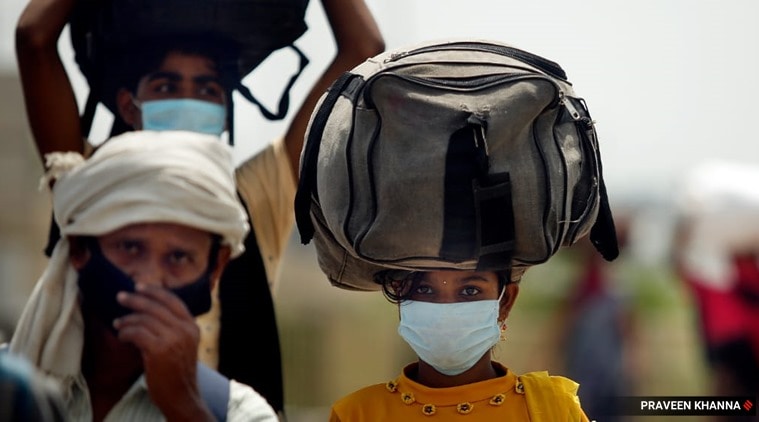 When SC took up suo motu the plight of migrant labourers, the country’s Solicitor General Tushar Mehta claimed that the Centre is doing a lot to address the situation created by the COVID-19 pandemic. (Express File Photo by Praveen Khanna)
When SC took up suo motu the plight of migrant labourers, the country’s Solicitor General Tushar Mehta claimed that the Centre is doing a lot to address the situation created by the COVID-19 pandemic. (Express File Photo by Praveen Khanna)
When the Supreme Court took up suo motu the plight of migrant labourers, the country’s Solicitor General Tushar Mehta claimed that the Centre is doing a lot to address the situation created by the COVID-19 pandemic. In a rare display of combativeness, he described those who contested his claim as prophets of doom. He alleged that these critics were spreading “negativity, negativity, and negativity”. Mehta urged the court to call upon such persons to prove their credentials by filing affidavits disclosing their contribution towards easing the crisis. He also took potshots at journalists reminding the Court of a photographer who went to Sudan where he photographed a vulture and a panic-stricken child; the photograph earned him the Pulitzer prize, but within days of receiving the honour, the photographer committed suicide because he suffered from the guilt of having preferred photography to rescuing the beleaguered child.
Read | Mr Mehta’s lecture
Simply put, Mehta’s outburst tantamounts to asking the media, or for that matter any public-spirited person or a group of persons, to refrain from highlighting the plight of the migrants who have been forced to walk on foot for hundreds — even thousands — of kilometres without food and water and without a penny in their pockets in a desperate attempt to be with their loved ones. Such reporting, in the Solicitor General’s view, spreads negativity. Mehta is reported to have clarified that his remarks were not directed against the media but the context in which he spoke did imply that he was referring to the media.
Not only was the Solicitor General uncharitable to the brave souls who have been voicing the travails of the millions of people facing untold miseries on account of the alleged mishandling of the situation by the authorities, but he also made highly uncalled for remarks against the high courts. He alleged that some of these courts were running a parallel government.
It is the constitutional duty/obligation of every high court to pass such orders, or directions, as it may deem fit in case it finds that the state or its functionaries are not performing their duties towards the citizens as mandated by law. Such orders cannot be seen as intrusions into the executive domain nor should they be likened to running a parallel government. In any case, the aggrieved state government has the option to appeal to the Supreme Court to annul or modify the offending order.
Nobody is saying that the government has done nothing to mitigate the sufferings of the people infected by COVID-19 or those affected by the lockdown, but surely it has to do much more in terms of providing food, shelter, medical aid and transport. The state and the civil society must come together to ameliorate the lot of the vulnerable members of our society who suddenly find themselves without jobs and homes. If some senior lawyers wanted to highlight the administration’s underperformance or the lack of coordination amongst the various wings of the state, they ought not to have been treated as adversaries or branded as prophets of doom.
The Solicitor General’s suggestion that those intervening in the matter should be made to file affidavits disclosing their contribution to the crisis is unfortunate. It is the fundamental right of every citizen to approach the court and be heard for the redressal of a wrong done to him or to the public at large. No citizen can be asked to prove his credentials in the manner suggested by the learned Solicitor General. In the adversarial system of justice followed in India, the court is able to sift the grain from the chaff only when both the positive and negative sides of a case are presented before it. So why was there an attempt to deny the other side from presenting its case?
The Solicitor General is the second-highest law officer of the country and also an officer of the court. Given his unique position, he should be careful with his words while dealing with his opponents. This will also be in keeping with the dignity and decorum of the Court.
Let remember the words of Mahatma Gandhi who said, “The true measure of any society can be found in how it treats its most vulnerable members”.
The writer is a former judge of the Delhi High Court